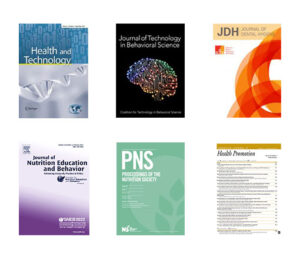Satter Eating Competence Model (ecSatter)
The Satter Models include the Satter Division of Responsibility in Feeding Children (sDOR) and the Satter Eating Competence Model. To learn more about sDOR visit the Ellyn Satter Institute. Learn about Eating Competence by reading below. Both models can be measured with tools – click the links below to learn more.
ecSatter is an intra-individual approach to eating and food-related attitudes and behaviors that entrains positive bio-psychosocial outcomes. ecSatter addresses eating attitudes and behaviors, internal regulation of intake, food acceptance, and skills related to selecting, preparing, and planning meals.
Learn more about the evidence base for eating competence, click here to
download slides.
The Joy of Eating: Being a Competent Eater—Click to view.
“More specifically ecSatter encourages you to feel positive about your eating, to be reliable about feeding yourself, to eat food you enjoy, to eat enough to feel satisfied and to let your body weigh what it will in accordance with your genetic endowment.”
For more information, visit Ellyn Satter Institute
Interested in measuring eating competence? Click here for more information and permission to use the ecSI 2.0™.
Evidence-based Research
Research shows eating competence to be associated with higher diet quality, lower risk of cardiovascular disease, and a healthier lifestyle including reporting more physical activity. Supportive articles and publications are listed below.
Boeira CF, Nalon de Queiroz FL, Zandonadi RP, Rower HB, Nakano EY, Feoli AMP. Eating competence among Brazilian college students. Int J Environ Res Public Health. 2023;20(4):3488. doi: 10.3390/ijerph20043488.
de Queiroz FLN, Raposo A, Han H, Nader M, Ariza-Montes A, Zandonadi RP. Eating competence, food consumption and health outcomes: An overview. Int J Environ Res Public Health. 2022;19(8):4484. doi: 10.3390/ijerph19084484
Aittola K, Karhunen L, Männikkö R, Järvelä-Reijonen E, Mikkonen S, Absetz P, Kolehmainen M, Schwab U, Harjumaa M, Lindström J, Lakka T, Tilles-Tirkkonen T, Pihlajamäki J. Enhanced eating competence is associated with improved diet quality and cardiometabolic profile in Finnish adults with increased risk of type 2 diabetes. Nutrients. 2021;13(11):4030. doi: 10.3390/nu13114030.
Godleski S, Lohse B, Krall J, Satter E. Eating competence inventory subscale restructure after confirmatory factor analysis. J Nutr Educ Behav. 2019;81(8):1003-1010. https://doi.org/10.1016/j.jneb.2019.05.287
Tilles-Tirkkonen T, Aittola K, Männikkö R, Absetz P, Kolehmainen M, Schwab U, Lindström J, Lakka T, Pihlajamäki J, Karhunen L. Eating Competence is associated with lower prevalence of obesity and better insulin sensitivity in Finnish adults with increased risk for type 2 diabetes: The StopDia Study. Nutrients. 2019;12(1):104. doi: 10.3390/nu12010104
Lohse B, Pflugh Prescott M, Cunningham-Sabo L. Eating competent parents of 4th grade youth from a predominantly non-Hispanic white sample demonstrate more Healthful Eating Behaviors than Non-Eating Competent Parents. Nutrients. 2019;11:1501. doi:10.3390/nu11071501.
Lohse B, Krall JS, Psota T, Kris-Etherton PM. Impact of a weight management intervention on eating competence: Importance of measurement interval in protocol design. Am J Health Promot. 2017;41(4):1-11. doi:10.1177/0890117117692201.
Ruder EH, Lohse B. NEEDs For Tots: A teacher-ready and parent-friendly curriculum focuses on Principles of the Satter Division of Responsibility in Feeding. J Nutr Educ Behav. 2017;49(4):357-359. doi: 10.1016/j.jneb.2016.12.011.
Quick V, Shoff S, Lohse B, White A, Horacek T, Greene G. Relationships of eating competence, sleep behaviors and quality, and overweight status among college students. Eating Behaviors. 2015;19:15-19. doi:10.1016/j.eatbeh.2015.06.012.
Lohse B. The Satter eating competence inventory for low-income persons is a valid measure of eating competence for persons of higher socioeconomic position. Appetite. 2015;87:223-228. doi: 10.1016/j.appet.2014.12.228
Lohse B, Arnold K, Wamboldt P. Evaluation of About Being Active, an online lesson about physical activity shows that perception of being physically active is higher in eating competent low-income women. BMC Womens Health. 2013;13(1):12. doi: 10.1186/1472-6874-13-12.
Lohse B, Cunningham-Sabo, L. Eating competence of Hispanic parents is associated with attitudes and behaviors that may mediate fruit and vegetable-related behaviors of 4th grade youth. J Nutr. 2012;142:1903-1909. doi:10.3945/jn.112.164269.
Lohse B, Bailey R, Krall J, Wall D, Mitchell DC. Diet quality is related to eating competence in low-income females in Pennsylvania. Appetite. 2012;58(2):645-650. doi:10.1016/j.appet.2011.11.022.
Krall JS, Lohse B. Validation of a measure of the Satter eating competence model with low-income females. Int J Behav Nutr Phys Act. 2011;8:26. doi:10.1186/1479-5868-8-26.
Greene GW, Schembre SM, White AA, Hoerr SL, Lohse B, Shoff S, Horacek T, Riebe D, Patterson J, Phillips BW, Kattelmann KK, Blissmer B. Identifying clusters of college students at elevated health risk based on eating and exercise behaviors and psychosocial determinants of body weight. J Amer Diet Assoc. 2011;111:394-400. doi:10.1016/j.jada.2010.11.011
Psota T, Lohse B, Kris-Etherton P. Repeated measures of eating competence over a 12-month nutrition education program revealed rebound following early decline: Implications for interventions planned to enhance eating competence. Annual Meeting of the American Society for Nutrition, Experimental Biology. Boston, MA; April 9, 2013. FASEB J. 2013:27:626.6.
Lohse, B, Arnold, K. Measuring eating competence: Congruence between two Satter inventories supports supplanting the original version with the low-income adaptation. Food & Nutrition Conference & Expo. Philadelphia, PA: October 6-9, 2012. J Acad Nutr Diet. 2012;112(9 Suppl3):A63.Abstract

